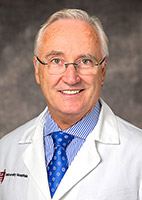UH Dermatologist Goes to Great Lengths to Put Patients First
August 18, 2024
UH Clinical Update | August 2024
Dermatologist Kevin Cooper, MD, sees patients at their most vulnerable. Many are dealing with the debilitating and disfiguring consequences of psoriasis, while others are facing the life-threatening illness of cutaneous lymphoma. Each demands total attention – always the goal but not always easy to achieve.
 Kevin Cooper, MD
Kevin Cooper, MD“It’s important to provide your best self to patients all day long and all week long, so that the people at 3 p.m. are getting the same you that the people at 10 a.m. got,” he says.
To make this a reality in his practice, Dr. Cooper draws on a somewhat unusual source – the tactics used by former tennis great Ivan Lendl to maintain focus between individual tennis points and games in lengthy but fast-moving tennis matches, where even short loss of focus can cost points, games and the ultimate win. Dr. Cooper’s spin on this? For every four patients he sees, he takes a mini-break to reset – maybe getting a glass of water or taking a short walk in the hall.
“It's not the water,” he says. “It's just that little motion that reminds me to reset. I then go back into a room, charge up and be as sharp as I can be again.”
UH CEO Cliff A. Megerian, MD, FACS, Jane and Henry Meyer Chief Executive Officer Distinguished Chair, cited this kind of dedication to patient well-being when recently recognizing Dr. Cooper with a “Dinner with the Doc” honor.
Beyond his work with patients, Dr. Cooper also holds a leadership position at UH. As Chairman of Dermatology at UH Cleveland Medical Center and the Henri Pell Junod, Jr. Chair in Dermatology, he embodies the three-part UH mission – healing his patients, teaching residents and fellows and mentoring fellow faculty, and discovering new approaches to therapies. He’s been at UH for nearly 30 years, but in his prior position on the faculty at the University of Michigan Medical School, for example, he was among the first to show that psoriasis skin cell overgrowth is actually immunologically driven. This led to an immunological targeting drug -- the first biologic therapy approved by the FDA to treat psoriasis – with Dr. Cooper as co-inventor.
“Other drugs that have come along have really validated that and expanded it over into some of our other diseases as well,” he says. “These same kinds of approaches are now starting to take shape for cutaneous lymphoma, which I see a lot of clinically.”
Since those days, Dr. Cooper has conducted voluminous NIH-sponsored and other research at UH to move the field forward, publishing hundreds of scientific papers. One project being published soon, for example, has found that patients with psoriasis can be divided into different endotypes, and the “sticky” monocytes that some patients have can be used as biomarkers to predict response to therapy.
“We have a predictive biomarker for pharmacologic personalized therapy that increases your odds from be being 25% likely to respond to 80% likely to respond,” Dr. Cooper says. “It’s the right drug for the right patient at the right time, which is, of course, the goal of personalized medicine.”
This highly personal approach also characterizes his patient care.
“It's a matter of trying to get onto the patient’s wavelength,” he says. “I ask a lot of questions. I can prescribe something, but how doable is this for you? What's your schedule? When do you work? When do you come home? If you’re working two jobs, there’s maybe no way you’re going to put on another cream, or even remember to take a pill, so let’s think of something else. We always try to find something that they could do in the life that they're living.”
To nominate a physician for this honor, please click here. The next deadline is September 27.


